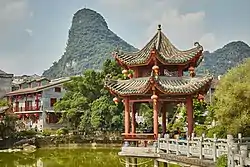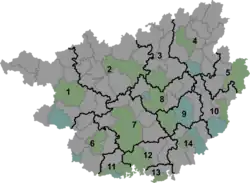Huangyao
黄姚镇 | |
|---|---|
 View from a garden in Huangyao | |
 Huangyao Location in Guangxi | |
| Coordinates: 24°14′52″N 111°12′04″E / 24.24778°N 111.20111°E | |
| Country | People's Republic of China |
| Autonomous region | Guangxi |
| Prefecture-level city | Hezhou |
| County | Zhaoping County |
| Time zone | UTC+8 (China Standard) |
Huangyao (Chinese: 黄姚; pinyin: Huángyáo) is a town in Zhaoping County, Guangxi, China. It has a new and an old part of the town; the old town of Huangyao (黄姚古镇) has a history of around a thousand years, and many of its buildings date from the Qing dynasty.[1]
History
It is believed that settlement of the Huangyao area began during the Song dynasty in the Kaibao era (968 – 977) of Emperor Taizu. The name Huangyao was first recorded in the Huangyou era (1049–1053) of Emperor Renzong when general Yang Wenguang passed through Zhaoping to pacify Guangxi,[2] and the place was named after the two most common surnames of the locals living in the area – Huang and Yao.[3][4]
The town first developed during the reign of Wanli Emperor (1572 – 1620) of the Ming dynasty, and it prospered during the reign of Qianlong Emperor (1735 – 1796) in the Qing dynasty. As a result, it has many buildings from the Qing and Ming eras, numbering at over 300.[5] The town was part of a number of administrative divisions throughout its history; today Huangyao includes both an old town and a new district.[2] Many of the buildings in the old town have stayed relatively unchanged in the modern era, and it began to develop as a tourist destination in the late 1990s and early 2000s. It was listed as one of 50 most worthwhile places to visit in China in 2006.[2][6]
Description


Huangyao is surrounded by karst peaks and traversed by streams. There are many bridges, and the streets are paved with slate.[5] There are over 30 temples, ancestral halls and pavilions in the old town of Huangyao. Many of the buildings are doubled-storied structures of simple construction in bricks and black tiles.[3]
Demographics
Huangyao has a population of around 50,000,[7] covering an area that included many villages.[8] Most of the people live in the new part of the town, with only around 2,000 remaining in the old town as many have moved into the new district.[2]
Popular media
Because of its picturesque location and old buildings, the old town of Huangyao has been used as a setting for a number of television dramas and films, such as the 2006 film The Painted Veil and the 2001 Chinese television drama Country Spirit.[1][9][4]
References
- 1 2 The Rough Guide to Southwest China. Rough Guides. 19 January 2012. pp. 335–336. ISBN 978-1-4053-9357-7.
- 1 2 3 4 徐赣丽 (October 2014). 文化遗产在当代中国:来自田野的民俗学研究. ISBN 978-7-5161-4987-4.
- 1 2 "Huang Yao Ancient Town". Yangshuo Insider.
- 1 2 陈建魁; 黄百鸣 (December 2014). 黄姓简史. ISBN 978-7-210-06665-1.
- 1 2 "黄姚古镇简介". 昭平县人民政府.
- ↑ 广西壮族自治区贺州昭平县黄姚镇.
- ↑ "黄姚镇". City Population.
- ↑ "Zoning codes and urban-rural division codes for statistics: Huangyao". National Bureau of Statistics of the People's Republic of China) (in Chinese).
- ↑ "Huangyao". Lonely Planet.